|
Dr. HARRY A. BUTOWSKY
August 5, 1944 - May 6, 2023
Harry A. Butowsky, Long-Tenured National Park Historian, Gone At 78
Following an extended illness, Dr. Harry Butowsky, formerly with the
National Park Service History Division, passed away May 6 at his home in
Reston, Virginia. He was 78.
Until his retirement in 2012, Harry’s career spanned a remarkable 35
years devoted to saving and interpreting the nation’s past. No less
remarkable, his love of history imbued his private life, notably a
research website praised nationwide. Nor were his friends in the least
surprised. The late Edwin C. Bearss, in a standout testimonial, credits
Harry with the spirit needed to make the History Division a success.
In 1981, Bearss elaborated, as the Park Service recruited for the
position of Chief Historian, “it remained empty, and I might never have
made a move toward it if it hadn’t been for Harry Butowsky.” Himself but
three years with the History Division at the time, Harry promised Bearss
all the administrative help he needed. Moreover, it was a promise Harry
kept. “Hire the best,” Bearss advised, and Harry never wavered,
confident that excellent leaders come from pursuing excellence, and that
Bearss would make the Division proud.
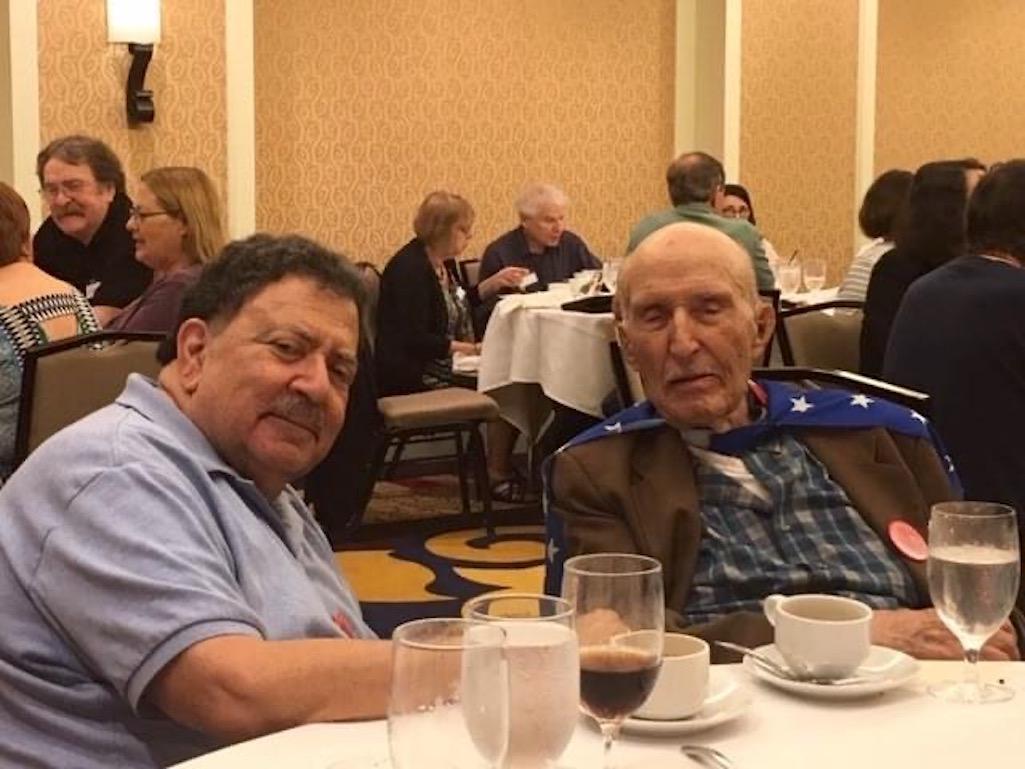
Edwin C Bearss (June 26, 1923 – September 15, 2020), takes a moment from
his 96th birthday party in Arlington, Virginia, to reminisce with his
dear friend and former colleague Harry Butowsky “To the practical
historians of the National Park Service, stay in the field,” Bearss
advised “Walk the ground and know it” Here were two that knew it
well/Butowsky Family
It was only natural to think that, Harry responded modestly, having
grown up in the shadow of World War II. Born August 5, 1944, in
Philadelphia, the so-called World War II generation was everywhere
present—and its values present, too. Personal accounts of the war moved
him deeply. Only the day before his birth, Anne Frank was betrayed and
captured in Amsterdam, Holland, then sent to Auschwitz before dying in
Bergen-Belsen. Stories like that made history real. By high school,
interspersed with working in his father’s store, Harry was reading
widely in military history from the American Revolution to World War II.
On graduating from Central High School in West Philadelphia, he
naturally picked history as his college major, earning his B.A. from
Penn State University in 1966. Within a year he had his M.A. from the
University of Illinois, and decided to stay on for a Ph.D. There he also
met his bride, Lois, whom he married in 1971.
Inevitably, now juggling family life and graduate school, reality
intervened, motivating his return east for a three-year appointment at
Monmouth College (now University) in New Jersey. “I should have picked a
simpler topic for my dissertation,” he later confessed. No doubt,
further bogged down by books in German script, he had taken on an
enormous load. Fortunately, his efforts did not go unnoticed. His
dissertation, Leopold von Ranke and the Jewish Question, remains a
critically important study speaking to the causes of World War II and
the Holocaust, complementing, in addition to military history, Russian
History, Jewish History, German History, the Holocaust, and the history
of Eastern Europe.
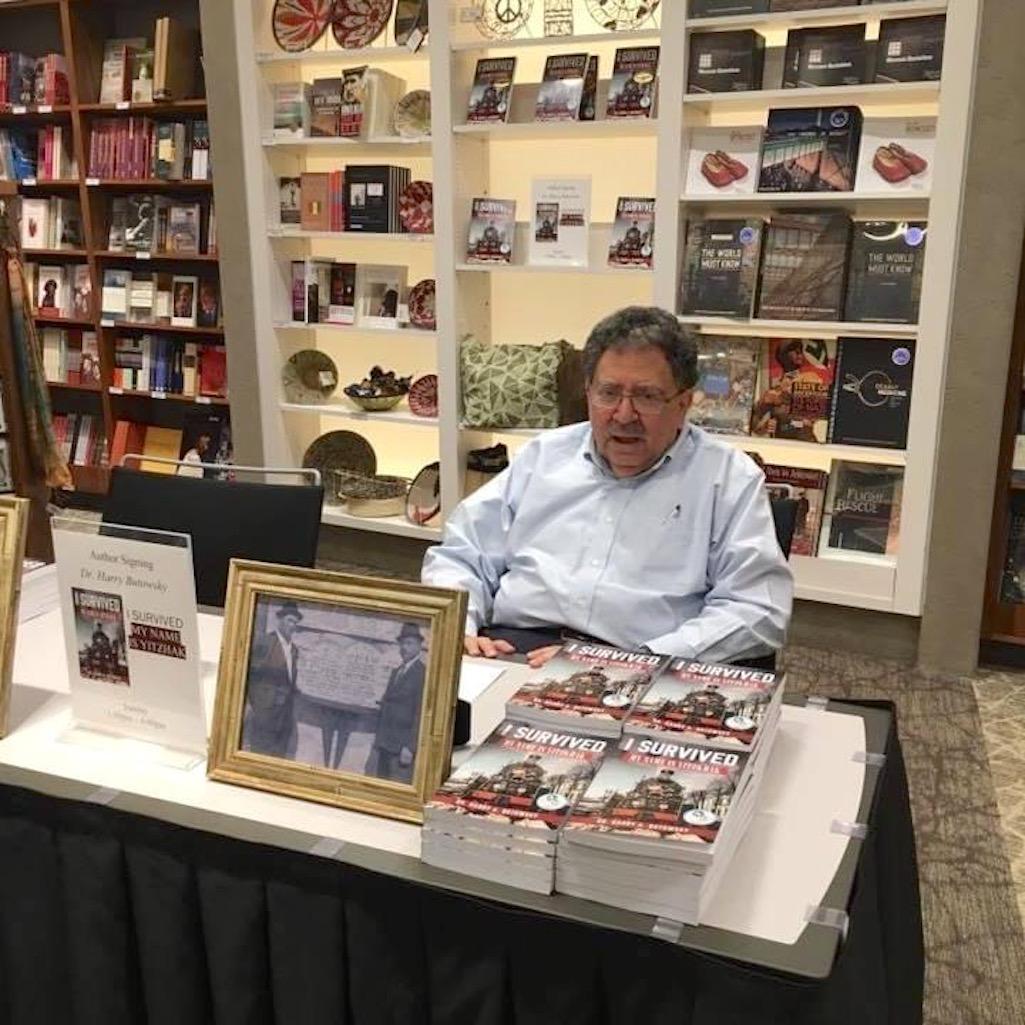
Harry’s World War II history, I Survived: My Name is Yitzkhak (2015),
brought immediate praise from the Holocaust Museum in Washington, DC, as
an outstanding contribution to Jewish history. A frequent guest of the
museum to speak and sign his book, Harry further relished meeting and
talking to visitors. No doubt, before this day in the gift shop ended,
Harry had either been talked out, or sold out, or both/Butowsky
Family
No matter, after finishing his Ph.D. in 1975 Harry found his
prospects bleak. “Like everyone else with a doctorate in history I
thought I would continue to teach, but the economy had other ideas.”
Monmouth College would advance to university status without him. His
only choice was to apply wherever he heard the word history, and in
1977, to the Middle-Atlantic Regional Office of the National Park
Service in Philadelphia. The opportunity there was to write, a
remembered opportunity, as it turned out, leading to his first major
Park Service study: “Appomattox Manor-City Point: A History.” It proved
the stepping-stone that launched his career, allowing his transfer in
1978 to a permanent position with the History Division in Washington,
D.C.
“I was so thankful to have a job in history,” he recalled. Best of
all, it turned out to be a job he loved. The Chief Historian at the
time, Harry W. Pfanz, was a military historian and combat veteran—as was
Pfanz’s successor, Ed Bearss.
“The work was intense, but fun,” Harry recalled. “We knew we were
doing important work.”
It is little wonder, on Pfanz’s retirement, that Harry threw his
support to Bearss, a Marine veteran of the Pacific Theater in World War
II. Pinned down by a Japanese machine gun on New Britain—“Suicide
Creek,” as the battle was called—Bearss had survived four wounds and two
years of convalescence. It forever sealed Harry’s respect for combat
veterans, in his opinion heroes all.
His private histories were similarly inspired by what people in the
war had overcome. His last book, I Survived: My Name is Yitzkhak (2015),
tells the story of Yitzkhak Neiman, a Polish Jew. After surviving the
collapse of the Polish army in 1939, Yitzkhak escaped east, and by 1942,
his cunning tested to the limit, was serving in the Russian army. It was
a post no less fraught with danger and still little chance of surviving
the war.
Of course, most of Europe’s Jews did not survive, including most of
Yitzkhak’s family, making his story all the more valuable to historians.
Harry was especially proud, having personally intervened to save and
chronicle it, of his standing invitation from the Holocaust Museum in
downtown Washington to give talks and sign copies of the book for
visitors. As an added tribute, in 2016 fellow historians and academics
named it the best biography of the year by a small independent
publisher.
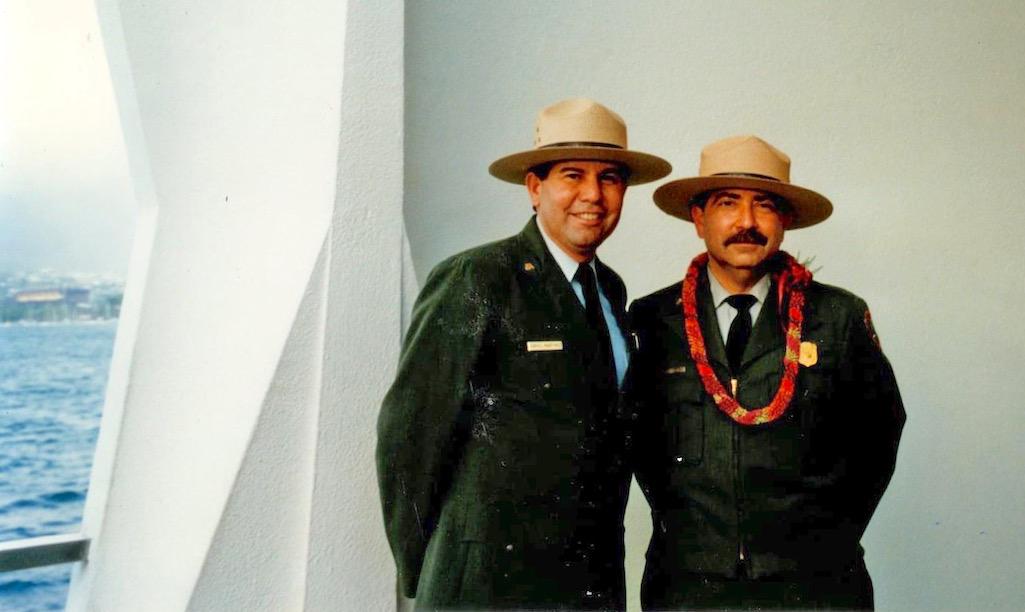
In one of his proudest moments, Harry (right) was invited to be the
guest speaker on Memorial Day, 1995, at the USS Arizona Memorial in
Pearl Harbor, Hawaii. It proved one of several such invitations. He is
flanked by Chief Historian Daniel Martinez, with all due credit to
Harry’s research, undoubtedly the most recognized media expert on the
attack of December 7, 1941/Butowsky Family
Harry’s favorite Park Service studies included his four-volume
history of the Man in Space Program, a study of Pacific Theater warships
in World War II, and the U.S. Constitution, the latter of which, along
with his advocacy, led to the establishment of Brown v. Board of
Education National Historical Park. Known as Landmark Theme Studies,
Harry did six in all while contributing to several others.
It stands as an amazing record, given the amount of research
involved, to say nothing of the time needed for writing. “Ed Bearss
allowed us just six months per volume, but we did it.” Nor did anyone in
the office—least of all Harry—complain.
He still missed teaching, and to everyone’s amazement, also found
time for that throughout his tenure in Washington, retiring in 2018 from
George Mason University as adjunct professor, a record totaling 38
years. His principal courses on World War II were both fully subscribed
and taught with distinction, his students confirmed. “Of course, I
piqued their interest by inviting veterans to speak," Harry said. "How
could they not like classes that made history come alive?”
Even then, Harry had saved the best for last. Retirement? What
retirement? His one disappointment, citing budgetary constraints, was
that the Park Service had never seemed to want the NPS History eLibrary
website he had created and managed. Now he could devote his time to a
private website. Thus was born npshistory.com, containing, in his
words, “upwards of 50,000 NPS reports, individual park reports, nature
notes, magazine runs, pamphlets, brochures, and books that are now
available for anyone to use free of charge. It is by far the largest
private website for NPS material and is used by NPS personnel, college
professors, students, and the general public, averaging 130,000 unique
visitors a month.” The national parks of Canada are similarly covered.
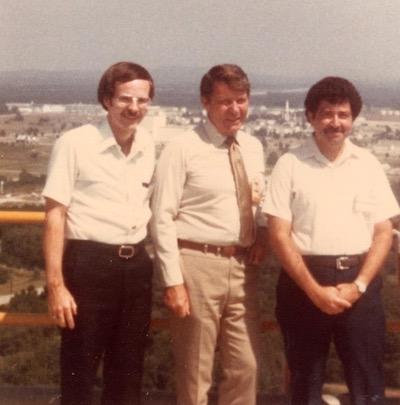
Mercury astronaut Wally Schirra (second from left) welcomed Harry
(right) and his team to Cape Canaveral, Florida, as part of Harry’s Man
in Space study. In the early 1980s, preservation of the Cape Canaveral
complex and Saturn V rocket (Apollo Program) consumed much of Harry’s
time/Butowsky Family
Harry’s co-founder on the site, Randy Payne, minces no words: “It is
an incredible legacy—beyond imagining, really. Who would have thought,
on being told no by the Park Service, that Harry would persevere?”
Another of his favorite pastimes, writing for the National Parks
Traveler, promised to “keep me on my toes,” as he put it. By that, he
meant still more articles upholding the qualities of the National Park
System and how it should be managed.
Harry is survived by his wife Lois (Jacobs) of 51 years, son Edward,
and daughter Karen, two grand cats, Neptune & Luna, and countless
friends, students, and grateful colleagues, who yes, use his website
every day.
Harry was preceded in death by his father Edward, mother Nettie,
sister Frances, a baby son, many beloved aunts, uncles, cousins, and
friends. Among colleagues, he would reserve special mention for Ed
Bearss, Bob Utley, Harry Pfanz, Dick Sellars, Ted Sudia, and Gordon
Chappell.
Rest in peace, Harry. As the plaque honoring Stephen T. Mather reads,
there will never come an end to the good that you have done. Mather
helped found the National Park Service; you and your colleagues ensured
it would last, and we do hope, further honoring your wishes, that all of
you are together again.
Alfred Runte
from National Parks Traveler, May 28, 2023
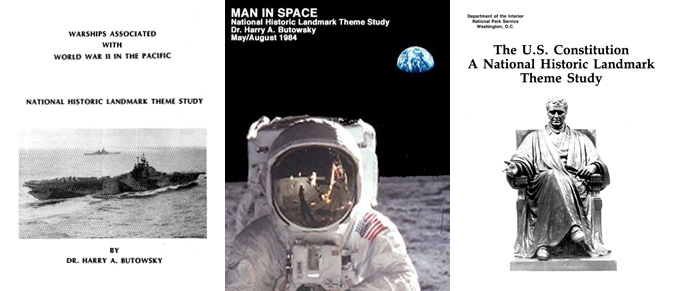
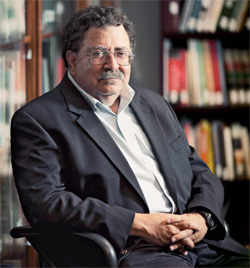 I first started collaborating with Harry in December 1999. At the time
I was volunteering as a Web developer for the parks in the Pacific
Northwest. Part of my duties were to digitize documents: administrative
histories, Nature Notes for Crater Lake and Mount Rainier National
Parks. Harry spotted this growing online body of digital documents and
contacted June Jones, the NPS regional Web coordinator to see how she
was getting these documents converted to the Web. June connected the
two of us and Harry asked if I'd be willing to convert The Origin and
Evolution of the National Military Park Idea by Ronald (Ronnie) Lee
for him — this digital document became my first contribution of
what would eventually become the NPS History eLibrary.
I first started collaborating with Harry in December 1999. At the time
I was volunteering as a Web developer for the parks in the Pacific
Northwest. Part of my duties were to digitize documents: administrative
histories, Nature Notes for Crater Lake and Mount Rainier National
Parks. Harry spotted this growing online body of digital documents and
contacted June Jones, the NPS regional Web coordinator to see how she
was getting these documents converted to the Web. June connected the
two of us and Harry asked if I'd be willing to convert The Origin and
Evolution of the National Military Park Idea by Ronald (Ronnie) Lee
for him — this digital document became my first contribution of
what would eventually become the NPS History eLibrary.
Back in the day, the Internet was still in its infancy — most people
used dial-up networking; files I shared with Harry were loaded onto
floppy diskettes and shipped via the mail — all pretty primitive by
today's standards. But it worked and the NPS History eLibrary slowly
grew. And it grew because Harry strongly felt that access to
information, particularly easy access to information, was critical for
both the operations of our parks but also to enhance visitor
understanding of our protected places. Paper documents on shelves in
the Harpers Ferry Library or park libraries were generally not
accessible to the public nor conveniently accessible to NPS employees.
Harry saw that a digital revolution was about to happen and access to
digital documents was an essential component of that revolution. He
shared those views in an article he wrote for The George Wright
Forum:
Managing the National Park Service in the Information Age
Harry Butowsky, extract from The George Wright Forum, Vol. 27 No. 3, 2010
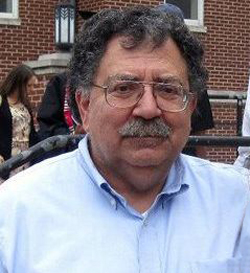 When Harry retired in 2012, he knew we had only scratched the surface in
scanning the vast amount of materials which the National Park Service
had produced in its nearly 100 year history, and he had hoped that
collaboration would continue with us as NPS volunteers working with his
replacement. Sadly, his position was never backfilled, but he felt
every bit as strongly that this was a job which was far from complete
and needed to be continued. Thus, NPSHistory.com was born — as an
independent collaboration, Harry and I would have the opportunity to
continue what began in 1999 by building upon what we started with the
NPS History eLibrary and taking this new digital library and
archive to the next level by providing a more varied range of NPS
materials and, hopefully, reaching a much wider audience.
When Harry retired in 2012, he knew we had only scratched the surface in
scanning the vast amount of materials which the National Park Service
had produced in its nearly 100 year history, and he had hoped that
collaboration would continue with us as NPS volunteers working with his
replacement. Sadly, his position was never backfilled, but he felt
every bit as strongly that this was a job which was far from complete
and needed to be continued. Thus, NPSHistory.com was born — as an
independent collaboration, Harry and I would have the opportunity to
continue what began in 1999 by building upon what we started with the
NPS History eLibrary and taking this new digital library and
archive to the next level by providing a more varied range of NPS
materials and, hopefully, reaching a much wider audience.
This October will mark the 10th anniversary of NPSHistory.com. Sadly
my friend and fellow collaborator will not be around to celebrate this
milestone, but we have Harry to thank for perserving in making this a
resource which we hope has proven useful and informative as a tribute to
"North America's Best Idea".
It has been said: "One person can make a difference and everyone
should try". Harry MADE a difference because he WAS
willing to try. It has been both a pleasure, and an honor, to have
gotten to know and work with Harry over these 20+ years. His job is not
yet finished — his dream not fully realized — his legacy
WILL remain — as well as a commitment to continue expanding
this library and archive "for the benefit and enjoyment of the
people".
Randall D. Payne
Co-creator NPSHistory.com/ParksCanadaHistory.com
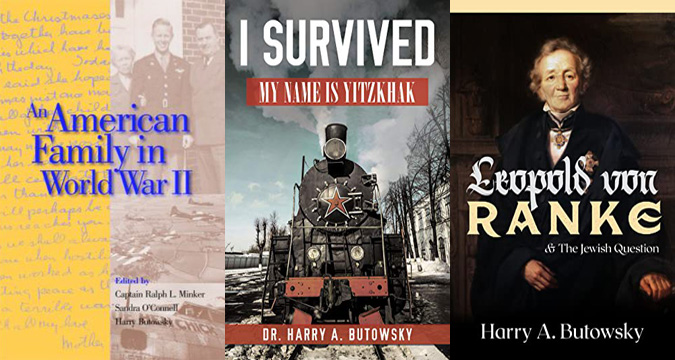
Obituary
Harry Allen Butowsky
Harry Butowsky was born in Philadelphia, PA, on August 5, 1944, the day
following the raid on Anne Frank’s House in Amsterdam, and as patriotic
anthems filled the Homefront city streets.
Harry grew up in West Philadelphia, recalling an idyllic if not scrappy
and rambunctious childhood, and then Northeast Philadelphia. Harry began
working after school and on weekends at his parents’ store, a chore he
loathed at first, but recalled of fondly in his later life. He traced
much of his ability to and love for connecting with others to this
experience.
Harry graduated from Central High School in Philadelphia, PA, in 1962,
and earned his bachelor’s degree in history from Penn State in 1966. He
attended the University of Illinois at Champlain-Urbana for his graduate
studies, earning a Doctor of Philosophy in German Jewish History in
1975. At the University of Illinois, he met Lois Jacobs, whom he married
in 1971.
In 1971, Harry and Lois moved to New Jersey and Harry began teaching at
Monmouth College (now University) in West Long Branch, NJ. While there,
their son, Edward, was born on June 5, 1974. In 1977, Harry began his
career in federal service with the National Park Service (NPS) in
Philadelphia, transferring to their headquarters in Washington, DC, in
1978. The family settled in nearby Reston, VA. Their daughter, Karen,
was born on September 21, 1981.
During his tenure with the NPS, Harry worked to preserve our Nation’s
most significant historical artifacts, including the Saturn V rocket in
Huntsville, AL, several WWII ships that served in the Pacific, and the
school involved in the 1954 Brown v Board of Education Supreme Court
decision.
Harry also taught history at George Mason University and Northern
Virginia Community College, delivering courses on American History,
History of the American Space Program, History of WWII in the Pacific
and in Europe, and the History of WWI.
Later in his NPS career, Harry managed the National Park Service History
Division’s web page.
Harry also began lecturing and delivering public interest programming on
topics ranging from WWII to the U.S. Constitution at the Rust Library in
Leesburg, VA, and the Reston Regional Library in Reston, VA. Harry also
began a cherished collaboration with Ralph Minker and his wife, Sandra
O’Connell, curating the letters Ralph and his family wrote to one other
when Ralph was serving in the 8th Air Force in Europe during WWII. The
book, “An American Family During WWII,” was published in 2005.
After 35 years of service, Harry retired from the NPS in 2012. In his
retirement, he continued to pursue his lifelong passion for teaching and
writing. In 2015, he published “I Survived, My Name is Yitzkhak,” an
oral history of Mr. Yitzkhak Neiman, a Polish Jew who served in the
Russian army during WWII, whom Harry had interviewed in the mid-1970s.
After his retirement, Harry and his co-collaborator Randy Payne
established the awarding winning NPShistory.com and
ParksCanadaHistory.com websites, electronic collections of thousands of
public domain documents relating to the history of the NPS, other U.S.
Department of Interior components, and Parks Canada.
Harry was an incredible intellect, individual, and storyteller. He was
also generous and giving, almost to a fault. During his life, he was a
witness and observer to the best and worst of the human condition.
Harry passed away peacefully at his home the early morning of Saturday,
May 6, 2023.
Harry is survived by his wife (Lois Jacobs) of 51 years, his son
(Edward), his daughter (Karen), his two grand cats (Neptune & Luna), and
many friends, students, and mentees.
Harry is preceded in death by his father (Edward), mother (Nettie),
sister (Frances), a baby son, many beloved aunts, uncles, cousins, and
countless friends.
Harry will be buried at Cool Springs Natural Cemetery, in Berryville,
VA, at 2pm on Thursday, May 11, 2023. The family is also planning a more
celebratory event in the weeks ahead. Details are forthcoming.
Butowsky family, May 2023
|